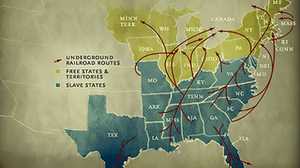Newspaper Opinions
America had the largest per capita newspaper circulation in the world at the time of the South's secession, and the war made the nation even hungrier for news. Correspondents headed for the battlefields, along with newsboys, who did a brisk trade selling papers to the soldiers. Even in the trenches, some soldiers obtained and debated the editorials from the latest journals. Civilians gathered at newspaper offices, anxious for news from the front. And editors unabashedly took up partisan positions, embarking on campaigns of their own to inform and persuade their readers.
The New York Tribune
Perhaps no newspaper reflected the national fervor for reform better than Horace Greeley's New York Tribune. Greeley founded his paper in 1841 and made it a part of his lifelong campaign to improve the moral character of the nation and alleviate the suffering of the poor. Liquor, tobacco, prostitution, and other common vices were frequent targets of the Tribune. But the Tribune's reformist platform did not propose the extension of equal rights to all. Although Greeley felt slavery should be outlawed, he did not believe African Americans should have the same rights and privileges as white men. He hired feminist Margaret Fuller to write for the Tribune, but believed women should remain within the traditional domestic sphere.
In the decade leading up to the Civil War, the Tribune delivered its most excoriating attacks on the "peculiar institution" of slavery. Initially, the paper, like its publisher, supported compromise on the issue. But as Greeley's views moved toward outright abolition, so did the Tribune's. The paper took a firm stand against the Fugitive Slave Act and the Kansas-Nebraskas Act, printing scathing anti-slavery editorials under the headline "The Voice of the North: No Extension of Slavery!"
Disappointed by the Whig Party's lukewarm position on abolition, Greeley helped cobble together the Republican Party. The Tribune backed Lincoln during his first run for the presidency, but not his second. By then, the paper counseled ending the war by way of compromise. Horace Greeley edited the Tribune until his death in 1872.
The Charleston Mercury
Published in the city that lay at the heart of the Confederate rebellion, the Charleston Mercury adopted a fiery pro-slavery, pro-secession stance. Under the direction of editor R.B. Rhett Jr., a cousin of the abolitionist Grimké sisters, the paper unleashed daily attacks on the North in general and abolitionists in particular.
The Mercury's eloquent, self-righteous defenses of slavery asserted that the states had a constitutional right to decide their own position on the issue, and that slave owners had a constitutional right to take their human property where they pleased -- including into the North. The Mercury also took Northerners to task for hypocrisy, insisting that Northern factory owners treated their workers worse than slaves. Further, the paper argued that slavery was a charitable Christian cause that kept intellectually and morally inferior blacks out of harm's way and provided for their needs.
As war grew closer, the Mercury became an even more strident proponent of secession, openly declaring the South's willingness to preserve slavery by military action if necessary. The paper remained a steadfast supporter of the Southern cause to the end of the war.
The New York Herald
America's first major "scandal sheet," the New York Herald delivered a daily dose of lurid true crime, social tragedy, and strident editorials against the swindlers of Wall Street and the hypocrites in the pulpit -- all for a penny. Launched in 1835 by James Gordon Bennett, the Herald quickly became one of New York's most popular -- and controversial -- newspapers.
But if the Herald was a popular success, it was also one of the Northern bastions of pro-slavery sentiment. In the years leading up to the Civil War, the Herald defended the rights of slavers and the Southern states, degraded African Americans, ridiculed abolitionists, and condemned the actions of the Lincoln administration.
When war broke out, angry mobs threatened to storm the Herald building. Bennett responded by raising American flags on the building -- and stashing guns in the office, in case of attack. The Herald eventually adopted a pro-Northern position, and even supported Lincoln for reelection in 1864. And its large staff of correspondents provided some of the best coverage from the battlefield. When Bennett died in 1872, his son, James Gordon Bennett Jr., took the Herald's reins and continued in the tradition of scandal and sensation that was the paper's trademark.







